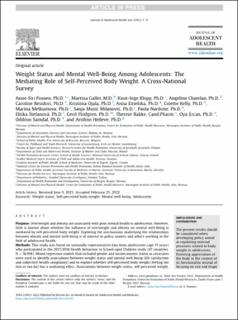| dc.contributor.author | Fismen, Anne-Siri | |
| dc.contributor.author | Galler, Martina | |
| dc.contributor.author | Klepp, Knut Inge | |
| dc.contributor.author | Chatelan, Angeline | |
| dc.contributor.author | Residori, Caroline | |
| dc.contributor.author | Ojala, Kristiina | |
| dc.contributor.author | Dzielska, Anna | |
| dc.contributor.author | Kelly, Colette | |
| dc.contributor.author | Melkumova, Marina | |
| dc.contributor.author | Musić Milanović, Sanja | |
| dc.contributor.author | Nardone, Paola | |
| dc.contributor.author | Štefanová, Eliška | |
| dc.contributor.author | Flodgren, Gerd Monika | |
| dc.contributor.author | Bakke, Therese Wardenær | |
| dc.contributor.author | Ercan, Oya | |
| dc.contributor.author | Samdal, Oddrun | |
| dc.contributor.author | Helleve, Arnfinn | |
| dc.date.accessioned | 2022-12-20T09:59:35Z | |
| dc.date.available | 2022-12-20T09:59:35Z | |
| dc.date.created | 2022-05-15T14:44:10Z | |
| dc.date.issued | 2022 | |
| dc.identifier.citation | Journal of Adolescent Health. 2022, 187-195. | en_US |
| dc.identifier.issn | 1054-139X | |
| dc.identifier.uri | https://hdl.handle.net/11250/3038773 | |
| dc.description.abstract | Purpose Overweight and obesity are associated with poor mental health in adolescents. However, little is known about whether the influence of overweight and obesity on mental well-being is mediated by self-perceived body weight. Exploring the mechanisms underlying the relationships between obesity and mental well-being is of interest to policy makers and others working in the field of adolescent health. Methods This study was based on nationally representative data from adolescents (age 15 years) who participated in the 2017/2018 Health Behaviour in School-aged Children study (47 countries, N = 76,998). Mixed regression models that included gender and socioeconomic status as covariates were used to identify associations between weight status and mental well-being (life satisfaction and subjective health complaints) and to explore whether self-perceived body weight (feeling too thin or too fat) has a mediating effect. Associations between weight status, self-perceived weight, and mental well-being were further assessed country by country. Results Self-perceived body weight mediated the observed associations between overweight or obesity and mental well-being. Perceiving one's body weight as “too thin” or “too fat” was associated with poorer mental well-being, regardless of weight status. Self-perceived body weight varied by gender, socioeconomic status, and country. Discussion Self-perceived body weight may explain, to a greater extent than body mass index, variation in mental well-being among adolescents. These results are important to policy makers, clinicians, and others targeting adolescent health. | |
| dc.language.iso | eng | en_US |
| dc.subject | Mental well being | |
| dc.subject | Mental well being | |
| dc.subject | Self perceived body weight | |
| dc.subject | Self-perceived body weight | |
| dc.subject | Weight status | |
| dc.subject | Weight status | |
| dc.subject | Adolescents | |
| dc.subject | Adolescents | |
| dc.title | Weight Status and Mental Well-Being Among Adolescents: The Mediating Role of Self-Perceived Body Weight. A Cross-National Survey | en_US |
| dc.title.alternative | Weight Status and Mental Well-Being Among Adolescents: The Mediating Role of Self-Perceived Body Weight. A Cross-National Survey | en_US |
| dc.type | Journal article | en_US |
| dc.type | Peer reviewed | en_US |
| dc.description.version | publishedVersion | |
| dc.description.version | acceptedVersion | |
| dc.source.pagenumber | 187-195 | en_US |
| dc.source.journal | Journal of Adolescent Health | en_US |
| dc.identifier.doi | 10.1016/j.jadohealth.2022.02.010 | |
| dc.identifier.cristin | 2024692 | |
| dc.relation.project | Nofima AS: 12047 | |
| dc.relation.project | EC/H2020/774210 | |
| dc.relation.project | EC/H2020/764985 | |
| cristin.ispublished | true | |
| cristin.fulltext | original | |
| cristin.fulltext | postprint | |
| cristin.qualitycode | 1 | |
